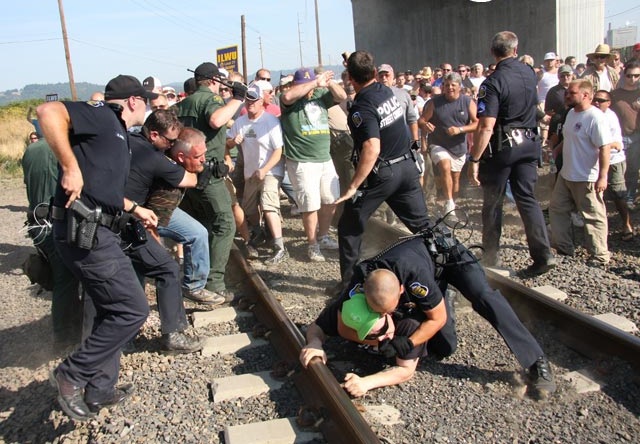forum
library
tutorial
contact

Labor War: Longshore Union Shows
Aggression in Washington Port Dispute
by Perry Chiaramonte
Fox News, July 31, 2014
|
the film forum library tutorial contact |

|
Labor War: Longshore Union Shows
by Perry Chiaramonte
|
 Shipments of grain have all but stopped at the Port of Vancouver and that couldn't have come at a worse time for wheat producers. That's because the wheat harvest is in full swing.
Shipments of grain have all but stopped at the Port of Vancouver and that couldn't have come at a worse time for wheat producers. That's because the wheat harvest is in full swing.
The shipments have been blocked because Washington state workers are no longer inspecting grain at the port. They stopped those inspections about a month ago. Now farmers are calling for those inspections to resume.
Already farmers have harvested about 40 percent of Washington's wheat.
So says Nicole Berg, president of the Washington Wheat Growers Association. She farms some 21,000 acres near the Tri-Cities in the south-central part of the state.
Berg says most of the region's grain is heading to Asian markets like Japan and Vietnam.
"Around 90 percent of the wheat in the state of Washington as well as the Pacific Northwest goes overseas," Berg says.
Wheat and other commodity crops have virtually stopped moving through United Grain's terminal at the Port of Vancouver.
And Berg says that's made her nervous.
"We have big concerns because I kind of feel like we're an innocent bystander down here on the farm level with different things that happen at the ports that are somewhat out of our control."
Last month, Washington Gov. Jay Inslee announced state patrol officers would no longer escort state grain inspectors across a picket line set up at the port by the International Longshore and Warehouse Union.
State grain inspectors say at times they've felt unsafe crossing the picket line. So without a police escort, the inspectors said they would no longer cross. But without inspections, it's virtually impossible to ship grain.
"I've never seen anything like this before," says Randy Ward, merchandising manager for Pendleton Grain Growers -- he moves the grain from the farmer's field to export terminals at ports throughout the region.
United Grain at the Port of Vancouver is the largest grain holding facility on the West Coast. And it's one of only nine export terminals that help move grain from Oregon and Washington, and as far east as Idaho, Nebraska, the Dakotas -- even Minnesota -- overseas.
Ward says if United Grain can't ship his wheat, it clogs up the whole system.
"Essentially what you're doing is taking the ability of them to push through bushels at their facility away from the market."
One possible solution would be for the feds to take over grain inspections. In fact, across the river at the Port of Portland, grain inspections have continued. That's because federal -- not state workers -- perform grain inspections in Oregon.
But so far efforts to get the U.S. Department of Agriculture involved at the Port of Vancouver have not been successful.
Yesterday, ten members of Congress from Washington, Oregon, Montana and Idaho sent a letter to U.S. Secretary of Agriculture Tom Vilsack, calling the lack of grain inspections "unacceptable" and urging the agency to "meet its statutory obligation to inspect wheat exports."
Blake Rowe, CEO of the Oregon Wheat Commission, says the inspections are USDA's responsibility.
"There's an agreement for Washington state to do the work in Washington but they're choosing not to do that and ultimately the responsibility falls back on USDA, the Federal Grain Inspection Service and they need to step up."
Rowe says with United Grain offline, shipping grain will only get more difficult as harvest ramps up in states further east.
"The capacity of the elevators on the Columbia -- that gets worse as harvest in those other states really gets cranked up. As the corn crop begins to come in, it's going to make the availability of United Grain even more critical," Rowe says.
United Grain Corporation locked out the ILWU in February 2013.
The company says it wants to lower labor costs to match a 2012 agreement between union workers and another firm, Export Grain Terminal (EGT), in Longview.
Pat McCormick, a spokesperson for United Grain, says it's all about staying competitive. He says the 2012 labor agreement gave the Longview company a cost advantage that United Grain -- as well as Columbia Grain in Portland -- would like to match.
He says United Grain and other terminals "are after a level playing field so that they can more fairly compete with EGT."
"That's what they like to say, that they feel the playing field is uneven now," according to Brett Lynch, with the ILWU. He says United Grain has been profitable.
"They are still competitive with the workforce that they have in place."
The union and United Grain Corporation resumed negotiations Wednesday. The two sides are expected to continue talks Saturday.
learn more on topics covered in the film
see the video
read the script
learn the songs
discussion forum
